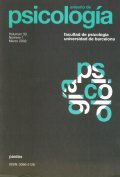Comportamiento anticonceptivo en estudiantes universitarios y riesgo de infección con el virus de immunodeficiencia humana (VIH)
Keywords:
AIDS prevention, contraceptive behavior, condom use.Abstract
We studied the eficacy of contraceptive behavior in 225 students (22.7% men and 77.3% women) in avoiding unwanted pregnancies and AIDS and other sexually transmitted diseases (STD). We asked about contraceptivebehavior with the last partner. No time limitations were imposed. Half of the subjects were not sexually active. Half of the contraceptive practices reported by the sexually active subjects were effective in avoid AIDS, other STD and pregnancy (use of condom in all cases). A third of the
practices were effective only in avoiding pregnancy (i.e. oral contraceptives) and the rest did not protect against any of the thrree possibilities (i.e. occasional use of candoms or coitus interruptus). With age and sexual experience the use of oral contraceptive increased and the use of condoms decreased. These findings show that young people are more concerned with avoiding pregnancy than with avoiding sexually transmitted diseases. More needs to be done to publicize the efficacy of the condom as a contraceptive
method and its protective role against disease.
Downloads
Published
2002-01-11
Issue
Section
Articles
License
The authors who publish in this journal agree to the following terms:
Authors transfer to the publisher all copyright for the full term of protection and for all the world.
The authors can post a copy of their articles in accordance with the policy of free access to the journal.


